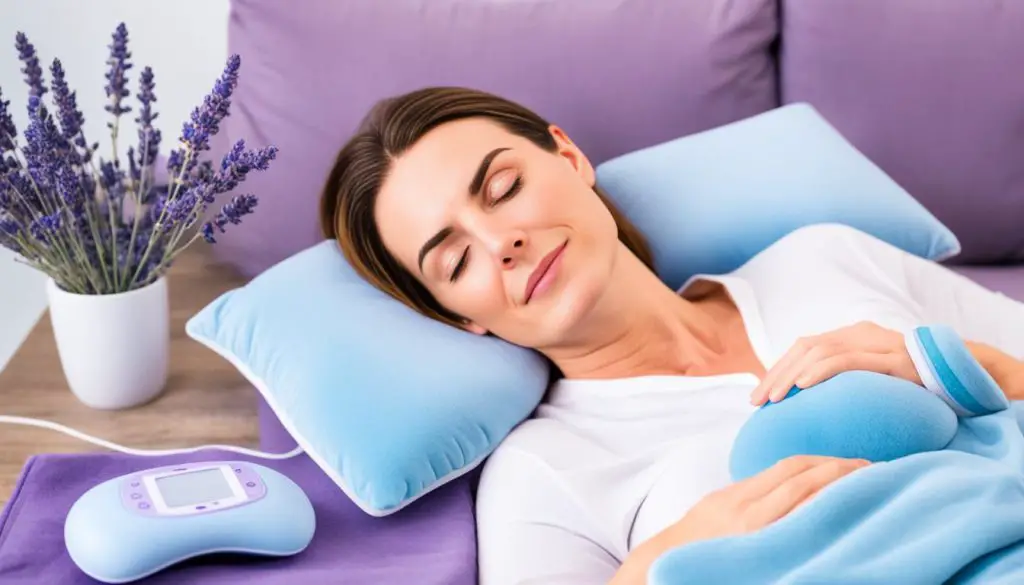I’m married to a woman who faces endometriosis and fibromyalgia. I’ve seen how these conditions affect her and our relationship. They impact our sex life, which can be a difficult topic.
But there’s hope. I want to share what’s worked for us in finding comfort during sex with endometriosis.
Endometriosis can make sex really hard. Do you or your partner struggle and wish for something better?
There are positive steps you can take. I’m here to present tips on making sex more comfortable for women with endometriosis. We’ll talk about how pain and sex are linked and ways to enjoy intimacy without the hurt.
Ready to improve your sex life despite endometriosis? Let’s start our journey towards better pleasure and comfort.
The Link Between Endometriosis and Painful Sex
Endometriosis and painful sex are linked. Growths from endometriosis can cause pain during intercourse. This happens because these growths can irritate nearby tissues.
The pain’s intensity varies by where and how much endometriosis you have. Deep penetration tends to cause more severe discomfort.
It’s essential to talk openly with your partner and doctor about sex pain. This discussion can lead to treatment options to reduce the pain and help you enjoy sex again. Proper management will boost your wellbeing and quality of life.
Managing Endometriosis Symptoms
There are many ways to manage endometriosis symptoms, like pain during sex. Hormone therapy, including birth control, can reduce endometriosis tissue growth. This lowers inflammation and eases symptoms.
Sometimes, laparoscopic surgery is advised. It can remove the endometriosis growths. This offers relief and enhances reproductive health.
Working closely with your healthcare provider is key. Together, you can find the best treatment that meets your needs. Talking about your symptoms and worries helps in finding solutions that tackle your pain’s cause, improving your sex health.
Communicating and Seeking Support
When sex is painful due to endometriosis, talking to your partner is key. It’s vital to explain what endometriosis is. This helps them offer better support.
Bring your partner to your doctor’s appointments. This lets them learn more about your condition from the expert. Their support will grow as they become more involved in your medical care.
Studies have shown endometriosis can strain relationships. Couples may face higher divorce rates. This makes clear communication and mutual support essential for dealing with endometriosis issues together.
Speaking with your partner is important, but you can also get help from professionals and support groups. They can give advice and share experiences. This support can be very encouraging and make you feel stronger.
Support Resources for Endometriosis:
- Endometriosis Foundation of America (EFA)
- International Pelvic Pain Society (IPPS)
- Online support groups and forums
- Local support groups or meetups
Endometriosis Divorce Rate
Endometriosis can strain relationships, sometimes leading to divorce. Yet, there is hope. By talking openly, seeking support, and managing the symptoms, you can keep your bond strong.
My Personal Experience
Getting support from my partner and communities has made a big difference for me. Being open about my struggles made us closer. We work together to tackle the challenges of endometriosis.
Remember, you’re not alone. Reach out for help to deal with the pain from endometriosis.
| Endometriosis Support Resources | Contact Information |
|---|---|
| Endometriosis Foundation of America (EFA) | www.endofound.org |
| International Pelovic Pain Society (IPPS) | www.pelvicpain.org |
| Online support groups and forums | N/A |
| Local support groups or meetups | Contact your local hospital or healthcare provider for information |

Strategies for Pain Management
Dealing with pain during sex due to endometriosis can be hard. However, there are ways to cope. Talking openly with your partner helps a lot. They can support you and understand what you’re going through.
It’s also key to talk to your healthcare provider about the pain. They can give advice and suggest treatments. These treatments aim to ease endometriosis and its symptoms.
Improving Sex Life with Endometriosis:
Noticing when your pain is the worst might help. For many, pain is greatest near their period. By keeping track of your cycle, you might find times when sex hurts less.
Exploring Different Sex Positions:
Trying new sex positions might reduce your pain. Positions that limit how deep penetration goes might work better. But what feels right varies for each person. It’s about finding what’s best for you and your partner.
Alternative Forms of Pleasure:
Sex isn’t always about penetration. Trying other ways to find pleasure, like oral sex or foreplay, can help. These methods might even enhance your bond with your partner. So, it’s good to be open to different ways of connecting.
By trying these tips, people with endometriosis can make their sex lives better. This way, they can enjoy being intimate with less discomfort.
Using Lubrication
Having comfortable sex with endometriosis can be hard due to vaginal dryness. This issue is common among those with endometriosis, especially if they are on hormone therapy. To make sex less painful, a special lubricant for vaginal dryness is very helpful.
It’s important to pick a safe lubricant for use with condoms and diaphragms. Some oil-based or natural options can harm latex. Water-based or silicone-based lubricants are safe for latex. They offer good lubrication that lasts.
Good lubricant can improve sex by reducing friction and making entry easier. A quality lubricant reduces pain, making pleasure better.
PubMed Central shows that using lubricants can make sex more comfortable for those with endometriosis. Lubrication fights vaginal dryness, allowing for a more enjoyable and satisfying experience.
Choosing the Right Lubricant
Choosing the right lubricant is crucial. Many types are out there. Consider the following when looking:
- Compatibility: Be sure it works with condoms and diaphragms, if you need it to.
- Ingredients: Look out for allergens or irritants in the ingredients.
- Consistency: Try different types to see what feels best for you.
- Long-lasting: A long-lasting lubricant can reduce the need to apply more often.
What you like is most important. You might have to try a few to find what fits you best.
| Lubricant Type | Advantages |
|---|---|
| Water-based lubricants | – Compatible with condoms and diaphragms – Easy to clean up – Suitable for most sensitive skin types |
| Silicone-based lubricants | – Long-lasting lubrication – Compatible with condoms and diaphragms – Ideal for water-related activities (shower, bath) |
| Oil-based lubricants | – Not compatible with latex condoms or diaphragms – May stain fabric – Can increase the risk of infections |
A healthcare provider or sexual health expert can help with your lubricant choice. They can give advice based on your needs.
Timing and Experimentation
Focusing on the right time can help with endometriosis pain during sex. Some women feel less pain after ovulation or in the two weeks after their period ends. You might find better times for sex by trying out different periods of the month.
Also, trying various sex positions can offer relief. Positions with shallow penetration are usually more comfortable.
Getting to know your own body and how it reacts is key. By testing different approaches and times, you can discover what works best for you.
Non-Penetrative Forms of Intimacy
When you live with endometriosis, intimacy goes beyond sex. There are many ways to be close without pain. This includes oral sex, clitoral stimulation, and massages.
Trying activities like these can make you feel good and stay close to your partner. They keep emotional connections strong. They also make sure both people feel loved and desired.
Taking part in non-penetrative intimacy can help people with endometriosis. It lets them keep a deep bond with their partner their way. This can be key for both in a relationship to feel connected and happy.

- Oral Stimulation: It’s a pleasurable way to connect without penetration.
- Clitoral Stimulation: It offers intense pleasure and an alternative to sex.
- Massage: Massages can relax, bring you closer, and reduce stress.
- Foreplay: It makes you excited, closer and doesn’t require penetration.
Being clear with your partner about what’s okay and what’s not is vital. This mutual understanding is crucial. It helps create a loving space that meets both partners’ needs.
Intimacy evolves. Trying different ways to connect keeps love alive. It also deepens the bond between partners over time.
about the importance of intimacy with endometriosis.
Communicating with Healthcare Providers
Talking with your healthcare provider about endometriosis and pain during sex is crucial. By sharing your symptoms and how they impact your sex life, you and your provider can search for tailored solutions. Your provider has the knowledge to suggest treatments that can decrease pain and make life better.
It’s important to tell your provider about any sex pain you feel. Tell them how strong the pain is, how often it happens, and how long it lasts. This will help your provider understand your pain better and offer advice that fits your needs.
Also, feel free to ask any questions or clear up any confusion you have. Your provider is ready to help and guide you through dealing with endometriosis.
Keep in mind, it takes both you and your provider to communicate well. Sharing your stories and concerns is key to getting care that deals with all your health needs.
Exploring Treatment Options
Managing endometriosis symptoms and pain during sex have various treatments. These aim to reduce inflammation, control tissue growth, and enhance reproductive health. This helps lead to a more comfortable and enjoyable sex life.
Hormone Therapy
Hormone therapy is a common treatment. It uses birth control pills or GnRH agonists. They adjust hormone levels to slow down endometrial tissue growth. This treatment can lower pain and discomfort in sex by shrinking endometriosis growths.
Laparoscopic Surgery
Laparoscopic surgery is another option. It’s a minimally invasive procedure to remove endometriosis tissue. A surgeon uses a laparoscope to see and take out these growths through a small cut in the abdomen. This improves pelvic health and decreases sex pain.
Your healthcare provider will help choose the best treatment for you. They look at your symptom severity, overall health, and reproductive plans.
Working closely with your healthcare provider, you can find relief from endometriosis symptoms. You’ll regain control over your sexual health. Since everyone’s endometriosis experience is different, finding the right treatment plan for you is key.
Emotional Support and Counseling
It can be tough dealing with pain during sex caused by endometriosis. This may deeply affect your feelings and your partner too. Getting emotional help through counseling is key. It gives you ways to handle endometriosis pain and work through the stress and anxiety that come with it.
In counseling, you get to talk openly about your feelings and the troubles you’re facing. A professional can help look at the emotions tied to endometriosis. They offer advice just for you and teach strategies. You also learn how to talk to your partner about what you need.
Moreover, counseling sheds light on the impact of endometriosis on your partnerships. Studies show endometriosis can lead to more divorces. So, counseling lets you understand your relationship’s dynamics and face issues head-on together.
Remember, seeking emotional help is not weak; it’s smart self-care. By taking care of your feelings, you can manage endometriosis better. This can lead to a better life overall.
Counseling and therapy for endometriosis:
- Individual therapy: Sessions with a therapist to focus on how endometriosis affects you emotionally.
- Couples therapy: Talking with your partner in therapy can help both of you communicate and support each other better.
- Support groups: These groups connect you with others who understand your journey, offering comfort and recognition.

| Benefits of Emotional Support and Counseling for Endometriosis | How It Helps |
|---|---|
| Validation and understanding | Offers a caring space where you can share your story, feeling that others are with you in your struggle. |
| Developing coping strategies | Provides you with tools to handle stress, anxiety, and the emotional hurdles that come with endometriosis. |
| Improved communication | Helps you become better at talking with your partner, leading to stronger and more supportive relationships. |
| Emotional well-being | Encourages you to take charge of your emotional health, which strengthens you to face endometriosis’s challenges. |
Self-Care Techniques
Handling endometriosis pain during sex needs self-care methods. Adding these practices to your life can work alongside medical treatments. They help you find relief from the discomfort. Here are some techniques to manage endometriosis symptoms and make sex more comfortable.
Taking Warm Baths or Using Heating Pads
Warm baths or heating pads can ease pelvic pain from endometriosis. The warmth relaxes muscles and lessens tension. This action reduces discomfort during sex. Enjoy a warm bath or apply a heating pad to your lower abdomen to reduce pain and relax before intimacy.
Using Over-the-Counter Pain Relievers
Non-steroidal anti-inflammatory drugs (NSAIDs) are helpful. They work well in dealing with endometriosis pain. Always use them according to your doctor’s advice to make sex more comfortable. Talk to your doctor before taking any new medicine.
Practicing Stress Management Techniques
Stress makes endometriosis symptoms worse. Learn stress reduction methods to find relief. Deep breathing, meditation, and activities that help you relax can lessen pain. Focus on self-care and stress management. These practices can improve both your body and mind.
| Self-Care Techniques | Description |
|---|---|
| Warm Baths or Heating Pads | Relaxing in warm baths or using heating pads on the lower abdomen can help alleviate pelvic pain and promote relaxation during intimacy. |
| Over-the-Counter Pain Relievers | Using over-the-counter pain relievers can provide temporary relief from endometriosis pain, making sexual activity more comfortable. |
| Stress Management Techniques | Practicing stress management techniques such as deep breathing, meditation, and engaging in relaxing activities can help reduce overall pain and improve well-being. |
Use these self-care techniques to manage endometriosis symptoms. They can help make sex more comfortable. Always talk to your healthcare provider for advice and personalized recommendations.

Seeking Specialized Physical Therapy
Physical therapy for the pelvic floor is great for easing endometriosis pain during sex. It helps by easing muscle tension and teaching relaxation techniques. You also learn special exercises to lower pain levels.
This therapy aims to make your pelvic muscles stronger and more relaxed. This makes sex more comfortable and enjoyable. It targets the specific issues caused by endometriosis to make sex less painful.
Sessions may offer massage to the areas in pain or tight, and exercises to control muscles better. These activities aim to reduce muscle spasms. As a result, sex should become less uncomfortable.
Choosing this therapy means getting care that fits just you. A trained therapist will craft a plan that tackles your specific issues. This should make the therapy more effective for you.
This treatment can work well alongside other medical help and changes in your daily life. It can really make a difference in how you manage pain from endometriosis. Your life quality might improve a lot.
Benefits of Pelvic Floor Physical Therapy for Endometriosis Pain Management
This therapy has many pluses for those with endometriosis and pain during sex. It can:
- Lessen muscle tightness
- Teach you how to relax the pelvic floor
- Make pelvic muscles stronger and better coordinated
- Improve the blood flow in your pelvis
- Make sex less painful
- Boost how good sex feels
| Physical Therapy Techniques | Benefits |
|---|---|
| Manual therapy (soft tissue mobilization, trigger point release) | Lessens tension, encourages relaxation |
| Therapeutic exercises | Strengthens the pelvic floor and improves control |
| Biofeedback | Teaches control over pelvic floor muscles |
Is Pelvic Floor Physical Therapy Right for You?
If sex is painful due to endometriosis, this therapy could help. You should talk to your healthcare team first. They can check if this therapy is good for you.
An expert physical therapist can check you and set up a plan that’s just for your needs. They will teach you exercises and tips to reduce pain during sex and make it more comfortable.
Choosing this therapy shows you’re taking a step to better your sexual health and general well-being. It is crucial for dealing with the effects of endometriosis. This is key to enjoying a satisfying sex life.
Want more details on pelvic floor therapy? Check out this study for more info.
Exploring Alternative Therapies
Endometriosis pain is often first fought with traditional medicine. Yet, some benefit from alternative therapies. These holistic practices support the management of pain and discomfort, especially during sex.
Acupuncture
Acupuncture, from ancient China, inserts thin needles into specific body points. It’s known to reduce pain and increase relaxation for some with endometriosis. This method seeks to balance the body’s energy and reduce symptoms.
Massage Therapy
Gentle massages on the stomach and pelvis could ease tension and pain. They also help blood flow. These massages, when done by a professional, can be adjusted to meet specific needs. They provide comfort and relief from endometriosis discomfort.
Mindfulness Practices
Mindfulness, like meditation and deep breathing, can lower pain and improve well-being. It focuses on finding calm in the current moment. This can reduce stress and the effect of endometriosis pain. Adding these methods to your daily routine can help you manage pain better and stay positive.
Alternative therapies might not work the same for everyone. Talk to your doctor about trying these practices alongside your medical treatment. They should supplement, not replace, traditional treatments for endometriosis pain management.
Summary:
| Alternative Therapy | Benefits |
|---|---|
| Acupuncture | Reduces pain, promotes relaxation |
| Massage Therapy | Relieves tension, improves blood circulation |
| Mindfulness Practices | Manages pain, reduces stress and anxiety |
Alternative therapies are not a stand-alone solution. They help manage endometriosis symptoms and promote health. Work with healthcare professionals to find what helps you best.
Lifestyle Modifications
Making lifestyle changes can help manage endometriosis symptoms and improve your well-being. By choosing healthy habits and self-care, those with endometriosis can enhance their quality of life.
A balanced diet full of nutrients is key for dealing with endometriosis. Eating foods that fight inflammation, like fruits, veggies, whole grains, and lean meats, is good. Cutting back on processed foods, sugar, and caffeine can also help.
Regular exercise is important for managing endometriosis too. It can lower inflammation, boost blood flow, and lessen pain. Try activities you like, like walking, swimming, or yoga, to improve your body and mind.
Reducing stress is crucial for managing endometriosis. Stress makes symptoms worse. Use deep breathing, meditation, or hobbies to relax and find joy.
Staying at a healthy weight also helps. Being overweight can mess with hormones and increase inflammation. A good diet and exercise routine can help keep you healthy.
Don’t smoke if you have endometriosis. Smoking is bad for inflammation, fertility, and your overall health. Quitting can really help with your symptoms and health.
By following these tips, you can improve your health. Managing endometriosis is about taking care of yourself. This includes good habits that help both your body and mind.
Lifestyle Modifications for Managing Endometriosis Symptoms
| Modification | Description |
|---|---|
| Eating a Balanced Diet | Incorporate fruits, vegetables, whole grains, and lean proteins to reduce inflammation. |
| Engaging in Regular Exercise | Participate in physical activities like walking, swimming, or yoga to promote blood circulation and reduce pain. |
| Managing Stress Levels | Practice stress management techniques, such as deep breathing exercises and mindfulness meditation. |
| Maintaining a Healthy Weight | Adopt a balanced diet and engage in regular exercise to maintain a healthy weight and reduce hormonal imbalances. |
| Avoiding Smoking | Quit smoking to decrease inflammation, improve fertility, and overall reproductive health. |
To learn more about lifestyle changes to manage endometriosis symptoms, you can check out this slideshow on WebMD.
Conclusion
With good communication and support, finding comfort during sex with endometriosis is possible. It’s key to talk openly with your partner and doctors about the pain. This helps in coming up with ways that work best for you.
Trying out different sex techniques and exploring various therapies can make things better. Taking care of yourself and your feelings is also really important. It helps when dealing with the tough parts of having endometriosis.
Getting ongoing support and taking charge of your health can lead to a satisfying sex life. You should not allow endometriosis to take over your life or love. Seeking help from professionals and being open to new strategies can greatly help you enjoy sex more, even with endometriosis.
If you’re interested in learning how to improve sex comfort with endometriosis, I suggest reading this article on Medical News Today. It offers tips from experts on how to deal with endometriosis symptoms and boost your sexual health. No matter what, know that there is support available, and you can still find joy and closeness, endometriosis notwithstanding.
